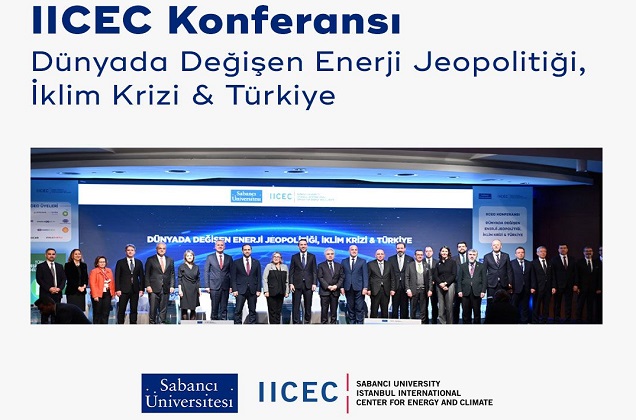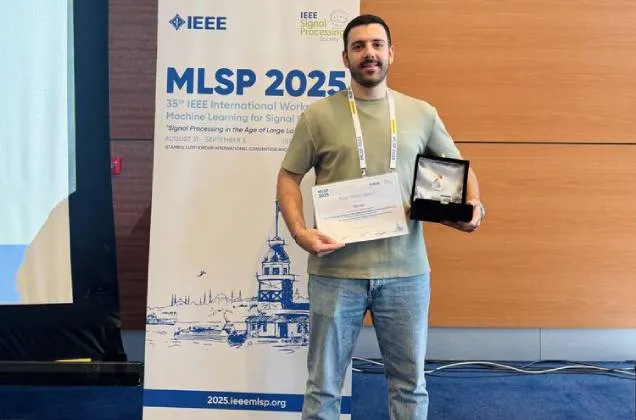25/12/2023
Sabancı University Istanbul International Center for Energy and Climate (IICEC), which focuses on the current issues of the world and Turkey's agenda, discussed the changing energy geopolitics. At the conference and panel with the theme "Changing Energy Geopolitics in the World, Climate Crisis and Turkey" held at Sabancı Center, changing energy geopolitics in the light of new developments, the climate crisis, which is the most important problem facing humanity, and the effects of all these on Turkey were discussed. Within the scope of the conference, the launch presentation of the "IICEC - Turkey Green Hydrogen Report 2023" prepared by IICEC was also made.

Dr. Alparslan Bayraktar, Minister of Energy and Natural Resources, stated that Turkey's foreign dependence on energy has decreased and said, “Turkey's foreign dependence on energy decreased to 67.8 percent in 2022. Our goal with the national energy plan is to save ourselves from foreign dependency and make Turkey a net-zero emission country in the next 30 years."
Dr. Fatih Birol, Executive Director of the International Energy Agency (IEA) and Honorary Chair of IICEC, reminded that he said that nuclear energy was indispensable for Turkey in meetings years ago and said, “When I look at Turkey's current energy situation and geographical situation, I think it is an indispensable technology. There has been a rapid return to nuclear energy in the world in the last two years, even within 1.5 years. However, you need to choose the partner country with which you will build the nuclear power plant very carefully. Turkey has now started nuclear power plant work. I hope Turkey will further increase its work on this issue and build other nuclear power plants."
IICEC Director Bora Şekip Güray, who made the launch presentation of 'IICEC - Turkey Green Hydrogen Report 2023' at the conference, said, "As a country, we have versatile opportunities and areas of development in green hydrogen," and shared IICEC’s suggestions that will support sustainable growth in green hydrogen.
Energy dynamics changing on a global scale, the climate crisis, which is one of the inevitable issues for a sustainable future, and the effects of these two issues on Turkey were discussed at the "Changing Energy Geopolitics in the World, Climate Crisis, and Turkey" conference and panel organized by Sabancı University Istanbul International Center for Energy and Climate (IICEC) at Sabancı Center. Following the panel held with the participation of senior people in the business and political worlds, the launch presentation of the "IICEC - Turkey Green Hydrogen Report 2023" prepared by IICEC was made by IICEC Director Bora Şekip Güray.
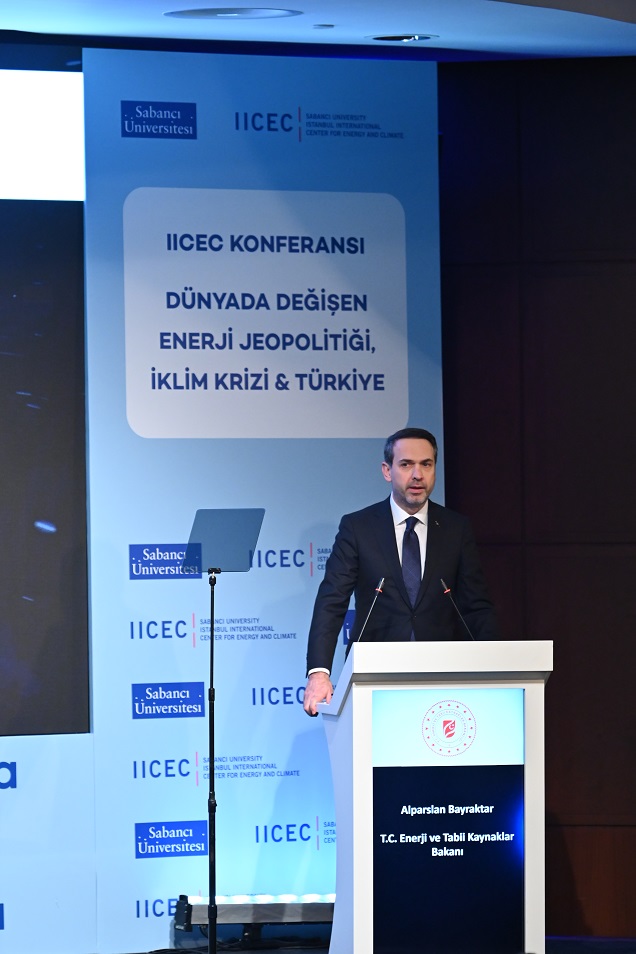
"Turkey's foreign dependence on energy dropped to 67.8 percent in 2022"
Stating that 6 trillion dollars are needed annually for the world's sustainable energy transformation, Minister of Energy and Natural Resources Alparslan Bayraktar continued as follows: "Successful energy transformation is definitely possible with smarter policies. As Turkey, we shape our energy policies in line with a 2050 net-zero emission economy, without compromising supply security, contributing to global supply diversity, and reducing our dependence on foreign sources. Even though we achieved a 30 percent reduction in Turkey's energy intensity in the last 21 years, Turkey's energy demand doubled. We expect it to increase another fold in the next 20 years. In 2022, Turkey's foreign dependency on energy has decreased to 67.8 percent. Our goal with the national energy plan is to save ourselves from foreign dependency and become a country with net-zero emissions within the next 30 years. We intend to put our full renewable energy potential into use to achieve this transformation in our energy policies. When we look specifically at electricity, we predict that the demand will be around 515 terawatt hours in 2035. While meeting this high demand, we want to increase the share of renewable energy in total electricity production to 55 percent and its share in the installed capacity to 65 percent.
"We will invest 10 billion dollars in the electricity transmission network"
10 thousand megawatts of licensed products have been allocated in the field of renewable energy. Our industrialists have permits for approximately 26 thousand megawatts to make investments to meet their own consumption. They have a YEKA capacity of 5 thousand 400 megawatts. There are also 33 thousand megawatts of renewable storage. When we add these together, a capacity of 76 thousand megawatts has been allocated. Strengthening the electricity grid is a must for a sustainable energy transformation. We will make an investment of 10 billion dollars in the electricity transmission network in the next 7-8 years.
"We will increase our oil production to 100 thousand barrels in 2024"
After the discovery in Gabar Mountain in 2022, we started producing oil. As of today, we are producing 30 thousand barrels. In 2024, we will increase this to 100 thousand barrels. Turkey will become a country producing 200 thousand barrels of oil in its field. The need in our country is 1 million barrels per day, and we will do our best for this. In addition, within the scope of the 2024 - 2030 energy efficiency plan, Turkey will reduce carbon emissions by 100 million tons. In addition to being a reliable transit country in energy, we are also working on our own interests. We aim to implement emission trading within EPİAŞ next year."
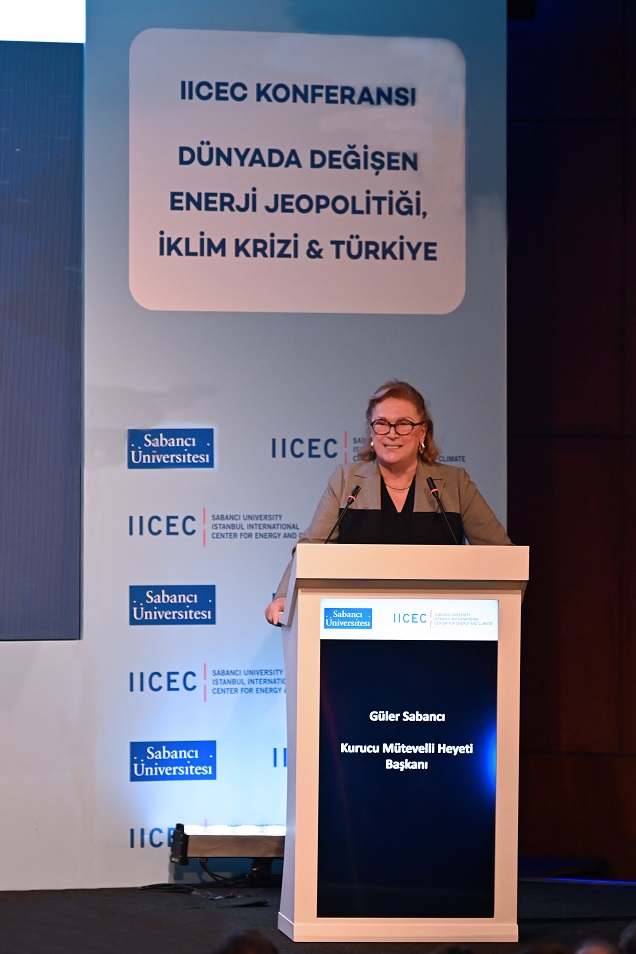
“We have become one of the most dynamic energy sectors in the world”
Güler Sabancı, Founding Chair of the Sabancı University Board of Trustees, started her speech by congratulating Dr. Fatih Birol, Executive Director of the International Energy Agency (IEA) and Honorary Chair of IICEC, and said: “Under the leadership of Dr. Fatih Birol, the International Energy Agency has become an organization that directs global energy security and leads efforts to combat climate change and clean energy transformation in the world. Fatih Birol was listed among the 'TIME 100 Most Influential Climate Leaders' this year. Two weeks ago, the French Legion of Honor was presented to him by the French President at a special ceremony held at the Elysee Palace. I congratulate him.
Our esteemed Minister is one of the main architects of our energy sector's spectacular growth and development journey over the last twenty years. Our country has a strong development potential in energy demand. We have become one of the largest energy sectors in Europe and one of the most dynamic in the world. Recently, important steps have been taken by our Ministry of Energy and the private sector in many areas of energy. For example, we have become one of the leading countries in Europe in renewable energy installed capacity. Strong development in electrification stands out. Awareness in energy efficiency is increasing and new business models are developing. We have a strong potential to take these even further. We have important goals regarding energy security, efficiency, competitiveness, and a comprehensive, technology-driven energy transition with a net-zero target.
“IICEC's 'Turkey Green Hydrogen Future' report is a first in Turkey”
At Sabancı University, we have been prioritizing energy and climate issues for a long time. We founded IICEC more than a decade ago as an Energy and Climate center with the vision that these two issues cannot be separated from each other. IICEC continues to bring together the public, private sector, and academia, as it is today, towards goals that will support a safer and cleaner energy future, within the model I define as the 'Triangle of Success'. IICEC broke new ground in 2020 and published the 'Turkey Energy Outlook' report. Following this report, which was embraced by industry stakeholders, the 'Turkey Electric Vehicles Outlook' and 'Turkey Renewable Energy Outlook' reports were issued in 2021 and 2022, again as firsts in Turkey. This year, within the scope of the analytical project series, IICEC carried out a study that offers a future perspective by focusing on 'Green Hydrogen', which we expect to be on our agenda more intensively in the coming periods. The 'Turkey Green Hydrogen Future' report was completed, again for the first time in Turkey, with an analytical and holistic perspective, focusing on versatile dynamics and opportunities, and with a participatory approach with industry stakeholders.
I attach great importance to creating value from science-based approaches and business collaborations. It is now widely accepted that this unity has become one of today's most critical success factors. In this perspective, IICEC is a leading model and Center in Turkey. IICEC brings together leading organizations in its field and supports the sustainable energy future with common sense. For this reason, I would like to thank the IICEC Board Members, who are the supporters of IICEC, for their continuous support in the growth, expansion, and deepening of the center's activities.”

“80 percent of the emissions that cause the climate crisis come from the energy sector”
Fatih Birol, Executive Director of the International Energy Agency (IEA) and Honorary Chair of IICEC, pointed out that energy is starting to rise in the agendas of governments, people, and companies around the world and said the following: “Energy has always been important, but today it is becoming even more important. Energy is the driving force of the economy and economic growth. Energy prices play an extremely important role in the economic competition between countries. Clean energy technologies are also intertwined in terms of energy and geopolitics. Energy security is an extremely serious issue. Critical minerals such as lithium and cobalt, which we use in oil, natural gas, and critical clean energy technologies, are also extremely important issues, and geopolitics and energy are intertwined. Finally, when talking about the climate crisis, it is impossible to separate energy and climate. Because 80 percent of the emissions that cause the climate crisis come from the energy sector.
When we look at the energy markets, let me start with oil, prices are currently around 80 dollars. When we look at the coming months, even the year, and even a little bit ahead, we see an important trend, which is that we will see a slowdown in oil demand growth. There are two reasons for this. One is the developments in China and the second is the rapid growth of electric cars. On the other hand, this year we see that there is a huge increase in oil production in America and Brazil. When we look at the coming years, it is possible to see a more moderate level in production and oil prices if oil-exporting countries do not impose greater restrictions.
“There will be unprecedented new LNG production starting from 2025”
Secondly, natural gas is extremely important for us and our country. Europe's termination of its relationship with Russia in natural gas caused less damage than expected. It looks like Europe will get through this winter without too many injuries if there are no big surprises. Unless there is a major setback this year or this winter, Europe will spend this winter without experiencing a major gas outage. It is extremely important to us. As of 2025, within 4-5 years, new LNG (liquefied natural gas) production will come to the gas markets as never before. LNG facilities completed in many countries, especially two in America and Qatar, will bring significant gas to the markets. With the new LNG capacity to be added in 4-5 years between 2025 and 2028-29, up to 50 percent of the production in the last 30 years will come to the market within 4 years. In the gas markets, the seller countries are currently in a strong position, and the buyers are in a less powerful position, and this will completely change. In other words, buyers' hands will be stronger because there will be serious gas in the markets. This may cause some balances to be redefined both economically and geopolitically.
“There is a tremendous revolution in the field of renewable energy”
There is a tremendous revolution in the field of renewable energy. More than 80 percent of all power plants built in the world this year are renewable energy. Especially the solar, but then the wind and others follow. There's a little bit of nuclear. In other words, the share of fossil fuels, coal, and natural gas, is gradually decreasing. The solar growth is truly impressive all over the world. Renewable energy is coming not from the west, but from the east, with China, India, and Brazil coming quite quickly in this regard. Very good steps are being taken in this regard in Turkey.
“I hope Turkey will build other nuclear power plants as well.”
Regarding nuclear energy, when we had this meeting years ago, one of our former energy ministers asked me such a question: What do you think about nuclear energy? I said that nuclear energy is an indispensable technology for Turkey. When I look at Turkey's current energy situation and geographical situation, I think it is an indispensable technology. There has been a rapid return to nuclear energy in the world in the last two years, even within 1.5 years. There was a decline in nuclear energy after the last Fukushima accident, now countries are rapidly returning to nuclear energy. Japan, Korea, and China are already one of the leading countries in this regard. When we look at Europe, Sweden, Finland, France, England, and Canada, many countries, as in our country, are experiencing rapid construction in nuclear energy and a renewed interest in nuclear energy. There is an appetite.
However, you need to choose the partner country with which you will build the nuclear power plant very carefully. It is necessary to choose this carefully in terms of technological competencies, the country's foreign policy, energy security, and energy diversification. Turkey has now started working on nuclear power plants, I hope that Turkey will further increase its work on this issue and build other nuclear power plants.
On the other hand, electric cars are growing so fast that this leads to changes in policies and production policies, especially in oil-exporting countries. Three years ago, 1 in every 25 cars sold in the world was an electric car. We were talking about this as important news. 1 in every 5 cars sold this year is an electric car. According to the most conservative estimate, in 2030, one in every 2 cars sold in the world will be an electric car. This will have serious repercussions, both on the oil markets and the car industry. In this regard, we need to follow the developments in electric cars closely if we want to understand the oil markets. In summary, in the current world energy markets, we see a slowdown in the growth of fossil fuels. There is also a rapid increase trend in clean energy technologies, renewable and nuclear.”
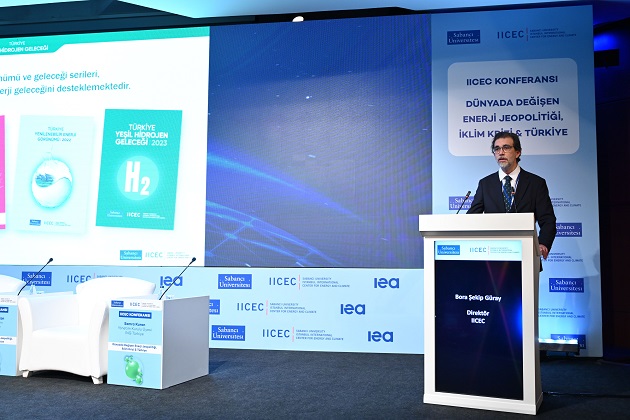
Versatile opportunities for the development of green hydrogen in Turkey and 7 IICEC recommendations
IICEC Director Bora Şekip Güray, who made the launch presentation of the IICEC Turkey Green Hydrogen Future 2023 Report at the conference, made the following statements: “'IICEC Turkey Green Hydrogen Future 2023' is the fourth of our reports that we have published, working with the vision of contributing to a safer and cleaner energy future. The use of green hydrogen will be prominent in sectors that are difficult to decarbonize through electrification. We assess that the Carbon Border mechanism will be an important factor. As a country, we have strengths and advantages in green hydrogen. Policy goals and strategies lay the groundwork for growth. Our strong renewable energy potential is an important advantage. With our National Energy Plan, technological development and localization opportunities, as well as trends in the sector, will be able to develop along with the growth in the green hydrogen ecosystem.
According to our analysis covering a perspective towards 2050, our country will reach a share of around 2 percent in the electrolyzer capacity, which forms the basis for green hydrogen in the world, and in green hydrogen production. Growth in this direction requires large amounts of electricity input and planning. In the future perspective, we see a strong demand potential, especially in some industrial branches and some transportation areas. We expect demand in industry and transportation to constitute 90% of total demand by 2050. Our analysis shows that green hydrogen could account for 6% of final energy demand in 2050.
In this future perspective, when viewed on the axes of reducing fossil fuel dependence and reducing greenhouse gas emissions, we can save twice the current annual energy consumption of sectors that are difficult to decarbonize. A decrease equivalent to 3.5 times the annual greenhouse gas emissions of these sectors can be achieved. The cumulative economic benefit of import and emission savings reaches 55 billion dollars by 2050 in 2022-dollar terms."
Stating that the report was based on the perspective of evaluating green hydrogen production opportunities primarily for the demands of the sectors in Turkey, Güray said that evaluating export gains with a maximum benefit approach would also add to the economic benefits in import and emission dimensions. He continued, “For green hydrogen, electricity generation facilities, electrolyzer facilities, and other infrastructures in the value chain are needed. The report indicates that we can provide an average annual benefit of $3.5 million at a cost of $3 billion. In other words, cumulatively the benefit-cost multiplier reaches 1.2. In 2050, this value increases to 2.4 on an annual basis. Therefore, the economics and competitiveness of growth in green hydrogen are strengthening, especially in the medium and long term.”
Stating that they collected their recommendations under 7 headings to support sustainable growth in green hydrogen, Bora Şekip Güray pointed out the importance of road maps, development in infrastructures and markets, technology opportunities, a large-scale sustainability perspective covering issues such as wind, sun, water and critical minerals, and human resources.
IICEC Recommendations:
IICEC recommends the following to evaluate Turkey's high potential, which offers versatile opportunities for energy security, clean energy transformation, competitiveness, localization, and technology-oriented industrial development, within the framework of its advantages in green hydrogen and related technologies:
1. Determining road maps regarding the development perspective in production, demand, and related infrastructures on the basis of priority sectors and regions,
2. Creating technical and regulatory infrastructures, preparing and implementing long-term master plans that will ensure optimal resource use and maximum security,
3. Establishing market and support mechanisms for efficient and predictable growth in the value chain, taking into account interactions with electricity, natural gas, carbon markets, and electricity supply security,
4. Evaluating opportunities in critical technologies, especially electrolyzers, storage and fuel cells, and developing localization and manufacturing capabilities,
5. Strengthening international and regional cooperation, utilizing export opportunities for Europe's increasing demand with maximum benefit,
6. Observing a broad-scale sustainability perspective throughout the ecosystem, in areas such as wind and solar resources and water use, critical minerals and supply chains,
7. Developing a qualified human resources and talent pool that will support sustainable growth and competitiveness and implementing a strong entrepreneurship ecosystem.
“We are facing another serious problem such as the climate crisis in the shadow of geopolitical balances.”
In his opening speech, Dr. Mehmet Doğan Üçok, Sabancı University IICEC Coordinator, noted that they held the 15th meeting of IICEC's traditional conference series and said: “The extensions of the issue in energy geopolitics are changing. In this context, energy security is at the point where national security, political economy, and foreign policy organically interact with each other. Today, our world is also changing, the sudden pandemic has rapidly changed our lives. Then the Russia-Ukraine war and the bitter war environment that is developing in the Middle East today. We are in a time when uncertainty increases and areas of predictability narrow. Analyzes are constantly being reshaped at every moment. We will see together whether there will be a return to the old days when energy determined geopolitics. Globally, we are faced with another serious problem such as the climate crisis in the shadow of geopolitical balances. When we founded IICEC about 14 years ago, one of the aims of IICEC was to draw attention to the climate issue, raise awareness, and convey the importance of the issue to society. We observe that the climate becomes more urgent with each passing year. IICEC continues to work in this context.”

Important topics were discussed in the panel
At the end of the conference, in the panel moderated by Sabancı Holding Energy Group President Kıvanç Zaimler, Zorlu Enerji CEO Sinan Ak, ALJ - Toyota Turkey Chair and CEO Ali Haydar Bozkurt, Ministry of Foreign Affairs General Manager of Energy and Environment and Ambassador Ayşe Berris Ekinci, SOCAR Turkey CEO Elchin Ibadov, BP Turkey Country President Tümkan Işıltan, and ING Turkey Board Member Semra Kuran were among the speakers.
Sabancı Holding Energy Group President Kıvanç Zaimler: “We believe there will be success for a sustainable future”
In the panel, Kıvanç Zaimler ensured that the issues were addressed in a multi-dimensional manner with his questions on a wide spectrum of critical areas on the world and Turkey's agenda, from geopolitics to clean energy, from technological development areas to different options in energy supply. Zaimler said, “The world is trying to solve many equations such as energy costs, supply security, and climate crisis. I believe in the importance of sharing our opinions and solution suggestions as industry stakeholders. We gave the floor to the valuable managers of the sector in this important platform and panel that we found through IICEC. Collaborations within the public-private sector-academia triangle are important in energy transformation. Although there are difficulties in the energy transition, we generally believe that humanity will be successful for a sustainable future."
Zorlu Enerji CEO Sinan Ak: “There are tens of thousands of megawatts of potential in renewable energy”
“It is obvious that we must direct our attention to China. We attended a fair there in May, we were able to go for the first time after the pandemic. We were able to go the previous time 4 years ago. When you see the enormous difference, one cannot help but be surprised. I can say that the developments in the field of solar, battery sector, and wind power plants are at an astounding level. China's biggest fear is that it has no oil. They cannot control oil and natural gas, they have tried their best to stay away from it. Turkey has a similar situation. Even though we are discovering oil and natural gas, there is a similar situation for us. Turkey is completely focused on domestic resources. As a country, we need to set a target here for both our own production and the production in neighboring countries, as well as for the development of renewable energy. There is a potential of tens of thousands of megawatts. It means a great opportunity, a great employment opportunity and at the same time, of course, the economy has a current account surplus. Another good thing is that we also have minerals for batteries in our country.”
ALJ - Toyota Turkey Chair and CEO Ali Haydar Bozkurt: “We are witnessing a revolutionary transformation in the automotive industry”
“We are witnessing a revolutionary transformation in an automotive industry that is nearly 100 years old. We are slowly moving away from internal combustion engines and moving step by step towards technologies we call electrification. It will not be a process like we will switch from electric vehicles to fully electric vehicles in one step from today to tomorrow. When you understand that it is not enough to transform the vehicle itself into an electric vehicle, which has been studied for a long time all over the world, then we see a very big picture. This photo tells us that making this vehicle electric is not enough. You need to make the electricity you charge the vehicle and the power plant you get the energy from environmentally friendly. When this vehicle is finished, you also need to worry about recycling it. You cannot solve this problem by limiting your work only to automobiles. You will make your factory and its logistics 360 degrees clean in the same way. In other words, your supplier who produces thousands of parts in that vehicle will also be clean, and the trucks that carry those parts to you will also be clean. Therefore, this will not happen from today to tomorrow. But inevitably we will get there. When we look at what falls on us, we first need to prepare our infrastructure for this. We have a lot of homework. There is one side to this job. We are talking about expensive technologies. The electric car is really a more expensive technology than normal conventional technologies. It will become cheaper over time, but if it is not encouraged all over the world today, no one will pay a penny more and buy an environmentally friendly technology. You need to encourage it.”
Ministry of Foreign Affairs General Manager of Energy and Environment and Ambassador Ayşe Berris Ekinci: “We can say that the crisis also created an opportunity for Turkey.”
“Turkey has a geostrategic position, and this position is also valid in energy. When we look at this position, we see the Russia-Ukraine war in the north and the developments in the Middle East in the south. On the other hand, we should not ignore Iraq with its developments in 2003 and subsequently, Syria with its war that has been going on for more than 10 years, and the sanctions against Iran, an important energy source country. In light of all these data, Turkey has to ensure energy supply security. The uncertainty caused by all the elements in the equation closely affects both the oil and natural gas markets. Although oil remains within a certain band, we are witnessing a turbulent period in oil prices. Turkey had the opportunity to cope better than many European countries with the energy supply security and diversity policies it has been pursuing for decades. It added LNG to its portfolio, and on the other hand, there was the opportunity to supply it from different countries. For example, in 2022, Turkey supplied gas from 15 different sources, including LNG sources. Plus, another important point is that with this crisis, Turkey also revealed that it can play a very important role in the energy supply security of Europe and especially the central and Eastern European countries. We can say that this crisis, in a sense, has also created an opportunity for Turkey, for the future.”
SOCAR Turkey CEO Elchin Ibadov: “The rise in electric vehicles has caused a decrease in demand and profitability for fossil fuels”
“In the number of electric vehicles sold, 1 in every 5 vehicles is electric today, and in a few years, it will be 1 in 2. It is obvious that we head there. This naturally led to a decrease in the demand for refinery products such as diesel, gasoline, and LPG, as well as a decrease in profitability. An important issue is the availability of the battery, its size is as important as its location. It will take some time for humanity to electrify the currently relatively large transportation and transport vehicles, trains, ships, and trucks. We should make good use of this period and spend our time on the rapid production of these technologies and their transformation into scalable investments. On the other hand, there are sustainable fuels. As SOCAR, we have taken important steps to produce sustainable aviation fuel. Since Turkish Airlines is the most important airline in Europe, I think they will definitely feel that pressure. The demand is going towards the production of sustainable refined products. Unfortunately, there are refineries and petrochemicals that are disconnected from each other, and their chances of success are decreasing in the coming period.”
BP Turkey Country President Tümkan Işıltan: “The one who adapts best to uncertainty will be successful”
“We live in a world of uncertainty. Therefore, whoever can adapt best to this uncertainty will be successful. To talk about the global scale, we have our traditional BP energy outlook report. We have three scenarios, accelerated, net zero, and new momentum. Accelerated and net zero describe what the world needs to do to reduce emissions by 95 percent. The new momentum scenario is where we will be in 2050 if we continue the pace of energy transformation that the world has reached now. It shows that when we continue this, emissions can only fall by 30 percent. On the other hand, when we look at the scenarios, we see four common trends. First, hydrocarbons are declining at a rate never seen in modern history. Secondly, we are witnessing the rise of renewable energy in a way that has never been seen in any energy source. Electrification is seriously entering our lives and the use of low-carbon hydrogen is increasing. Electrification is not possible in some sectors. What BP is trying to do is actually the 'AND strategy'. There is energy that the world needs right now, and we think we have an obligation to provide this energy. But at the same time, as “AND”, we need to invest in energy transition, especially in renewable and other low-carbon technologies, we think we should approach hydrogen in this way.”
ING Turkey Board Member Semra Kuran: “There is a 60 percent contraction in sustainability-related loans”
“If we look at the banks' side, very fresh commitments were in the air at COP28, and banks' appetite was good. We see that the increase in commitments has actually accelerated. When we look at the world's 24 largest banks, their total commitment until 2030 is well over 100 billion, they have a commitment of 15 trillion euros. Europe is a bit more of a pioneer in this regard. However, when we look at what has happened, we see that the increasing interest rate environment in the sustainability-related market does not have a very positive impact on investments. There is actually a periodic decline, around 30 percent. This includes a 60 percent contraction, especially in sustainability-related loans. When it comes to the energy sector, the picture is actually positive, growth continues in green loans. We can talk about two types of loans from the investor's perspective and the bank's perspective. One of them is large investment projects, infrastructure projects, and new technology investments, and the other one is loans in the field of economic consumption and energy efficiency that appeal to the end consumer. Here, the position taken by the capital investor is also important. The solution to this must come with a strong strategic solution. In the new world, banks are taking responsibility with this strategic solution. Of course, new technologies also carry certain risks. At this point, countries need to plan the resources to be allocated to this field, in line with their own goals and considering strategic cooperation.”
